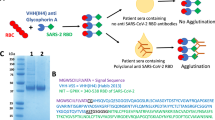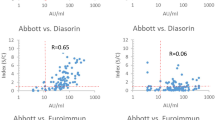Abstract
IN an area where several arthropod-borne viruses are active, the examination by complement fixation of acute and convalescent human sera to detect possible infection with local agents may be tedious and time consuming. Sometimes the convalescent sera alone are screened and those that react with one or more antigens are then paired with the acute specimen and, retested.
This is a preview of subscription content, access via your institution
Access options
Subscribe to this journal
Receive 51 print issues and online access
$199.00 per year
only $3.90 per issue
Buy this article
- Purchase on Springer Link
- Instant access to full article PDF
Prices may be subject to local taxes which are calculated during checkout
Similar content being viewed by others
References
Clarke, D. H., and Casals, J., Amer. J. Trap. Med. Hyg., 7, 561 (1958).
Lennette, E. H., in Diagnostic Procedures for Virus and Rickettsial Diseases, 1 (Amer. Pub. Health Assoc., New York, 1956).
Author information
Authors and Affiliations
Rights and permissions
About this article
Cite this article
CAREY, D. Use of a Combined Complement-fixing Antigen to detect Arthropod-borne Viral Infection. Nature 200, 1024–1025 (1963). https://doi.org/10.1038/2001024b0
Issue Date:
DOI: https://doi.org/10.1038/2001024b0
Comments
By submitting a comment you agree to abide by our Terms and Community Guidelines. If you find something abusive or that does not comply with our terms or guidelines please flag it as inappropriate.



